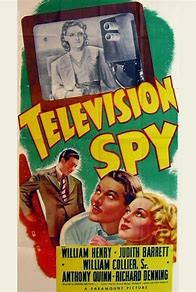 TELEVISION SPY (1939) – I’ve been reminiscing recently, what with Balladeer’s Blog’s 14th Anniversary just having passed a few days ago. I was reflecting on my long-ago review of the hilariously bad 1935 movie Murder by Television, which starred Bela Lugosi in a dual role.
TELEVISION SPY (1939) – I’ve been reminiscing recently, what with Balladeer’s Blog’s 14th Anniversary just having passed a few days ago. I was reflecting on my long-ago review of the hilariously bad 1935 movie Murder by Television, which starred Bela Lugosi in a dual role.
That flick presented the concept of television as if it would usher in miracles unrealistic enough to make the radar fetishism of the film Radar Secret Service seem low-key and logical. At any rate, I realized I had never gotten around to reviewing two other 1930s movies that looked at the still-developing television concept in melodramatic ways – Television Spy and Trapped by Television (1936).
That 1936 production starring Mary Astor and Lyle Talbot will need to wait, because today is about Television Spy. Part of this film’s charm comes from the inclusion of two up-and-coming players – Anthony F*cking Quinn, (who later dropped that troublesome middle name and became a major star) and Richard Denning himself!
Surely Quinn’s credits need no recitation, but for people who aren’t fans of Psychotronic movies I’ll point out that Denning played Governor Paul Jameson on the original Hawaii 5-0 after a career in B-movies like Unknown Island, The Black Scorpion, Creature with the Atom Brain, Target Earth and many more, including Creature from the Black Lagoon.
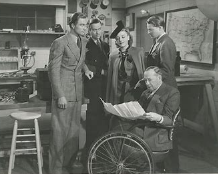 Television Spy runs just 58 minutes and stars William Henry and Judith Barrett as our romantic leads. William plays Douglas Cameron, a brilliant young scientist who seems to have licked the problem of long-distance broadcasts of television waves. NOTE: This was a real-life problem and limited primitive and experimental tv broadcasts to mere miles until the technology improved over time.
Television Spy runs just 58 minutes and stars William Henry and Judith Barrett as our romantic leads. William plays Douglas Cameron, a brilliant young scientist who seems to have licked the problem of long-distance broadcasts of television waves. NOTE: This was a real-life problem and limited primitive and experimental tv broadcasts to mere miles until the technology improved over time.
Cameron and his research partner Dick Randolph (Denning) score initial financing from grouchy, elderly, blustering tycoon James Llewellyn (William Collier). The forever shouting Llewellyn is annoyed with his grasping relatives who hang around him in hopes of inheritance money and with his meek yes-men business subordinates.
Douglas Cameron has impressed the wheelchair-bound millionaire through the trope of being the only person he deals with who refuses to kiss his butt. Cameron demonstrates for Llewellyn his new device for observing what goes on in his mansion via television devices on a closed circuit.
Our cranky Mr. Moneybags gleefully uses Cameron’s closed circuit tv to watch and listen in on his greedy relatives as they openly discuss wanting him to die so they can get rich. Among the actors playing those relatives are Byron Foulger and THE Ottola Nesmith, one of Vampira’s contemporaries in the first wave of Movie Hostesses in the 1950s.
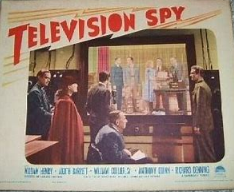 Next, Douglas and Dick demonstrate their more ambitious project for the short-tempered Llewellyn – coast-to-coast television broadcasting. The skeptical tycoon is convinced when our young inventors show him how they can already broadcast for hundreds of miles, and he agrees to fund their further research.
Next, Douglas and Dick demonstrate their more ambitious project for the short-tempered Llewellyn – coast-to-coast television broadcasting. The skeptical tycoon is convinced when our young inventors show him how they can already broadcast for hundreds of miles, and he agrees to fund their further research.
Like the characters in Murder by Television, the folks in Television Spy envision all kinds of unrealistic uses for long-distance television technology. Unlike the Murder by Television crowd, however, the people in this 1939 flick understand that tv won’t let them just tune in randomly to wherever in the world they want to spy on.
Still, though, Llewellyn wants to perfect long-distance television for the U.S. military. Spies from Europe also want television for their own militaries, so they hire a pair of traitorous New York City socialites played by Dorothy Tree and John Eldredge.
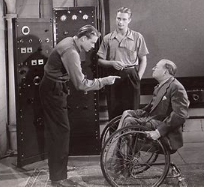 The socialites enroll a patsy – Burton Lawson (Minor Watson), a former business rival of Llewellyn’s – in a plan to beat the cranky man to perfecting long-distance television. They do that by stealing Douglas Cameron’s own plans and giving them to Lawson. Amid the espionage antics, Douglas falls in love with Lawson’s daughter, Gwen (Barrett).
The socialites enroll a patsy – Burton Lawson (Minor Watson), a former business rival of Llewellyn’s – in a plan to beat the cranky man to perfecting long-distance television. They do that by stealing Douglas Cameron’s own plans and giving them to Lawson. Amid the espionage antics, Douglas falls in love with Lawson’s daughter, Gwen (Barrett).
Anthony Quinn portrays mercenary hoodlum Forbes, whom the socialites hire to use his gun and his brawn against the captive Lawson and his daughter. Quinn already displays his screen presence and steals a scene or two.
SPOILERS AHEAD.
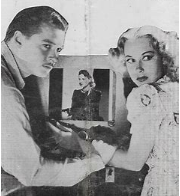 An accidental broadcast from Gwen Lawson jumps the gun and reveals to Cameron, Randolph and Llewellyn (NOT a law firm) that a rival broadcasting set with the same comically oversized screen is being worked on. This revelation adds to Douglas Cameron’s increasing impatience and his outbursts of anger at his serene and unflappable colleague Dick Randolph.
An accidental broadcast from Gwen Lawson jumps the gun and reveals to Cameron, Randolph and Llewellyn (NOT a law firm) that a rival broadcasting set with the same comically oversized screen is being worked on. This revelation adds to Douglas Cameron’s increasing impatience and his outbursts of anger at his serene and unflappable colleague Dick Randolph.
I don’t know if the filmmakers were setting up the much-abused Randolph as a red herring for the member of the Llewellyn household working with the spies. In any event, the traitor is the butler, not Randolph, but Cameron’s outbursts against Richard Denning include him saying “Obviously, you’ve made a mistake somewhere, Dick!”, presenting a light reminder of how expressions change over the decades.
Ultimately, the socialites and their European spymaster get taken down, the dueling millionaires bury the hatchet, and Douglas and Gwen are set for romance. Llewellyn’s sleazy relatives redeem themselves, and Quinn’s character Forbes is bribed to join the good guys.
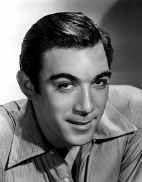 The most thoroughly bizarre development during the exciting(ish) finale comes when James Llewellyn gets so revved up that for some reason … he can walk again. (?) He’s very jubilant about it and the only thing missing from that absurd moment is him shouting “Mein Fuhrer, I can walk!” Dr. Strangelove style.
The most thoroughly bizarre development during the exciting(ish) finale comes when James Llewellyn gets so revved up that for some reason … he can walk again. (?) He’s very jubilant about it and the only thing missing from that absurd moment is him shouting “Mein Fuhrer, I can walk!” Dr. Strangelove style.
Most viewers would find Television Spy to be hopelessly dull, but for the Psychotronic-minded and for fans of Denning and Quinn, it’s worth the slim 58 minutes that it takes to watch.
FOR MORE BAD AND WEIRD MOVIES CLICK HERE.

Great reviews of bad movies. This film “Television Spy” actually doesn’t sound so bad to me. In comparison to the other bad movies which you have reviewed which included vampires, Nazis and crazy senior citizens. The premise for “Television Spy” brought to mind classic spy movies that I watched. For instance, the movie brings to mind the iconic “Mission: Impossible” franchise. This may seem like a far-fetched comparison, but the two films do share similarities. Both focus on spies, adventure and have an element of mystery. Recently, I had a chance to see “Mission: Impossible – Rogue Nation” and really enjoyed it. Not my favorite of the film franchise, but it does have the most awe-inspiring stunts from the great Tom Cruise. Here’s why it’s worth a watch:
Thank you. I liked your review of Mission Impossible: Rogue Nation.
As bad as that sounds, there’s something appealing about plain ol’ fun in a movie.
Exactly!
Congrats! Your posts are always excellent. Thanks for being
here. 🤙🙏🍻
Thank you very much for the kind words! I appreciate it!
That’s all true, and you are more than welcome.✌
😀
💯
Thank you very much!
Anthony Quinn!
Gwen.
Yep! What a legend!